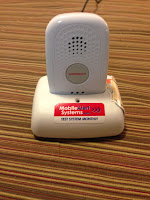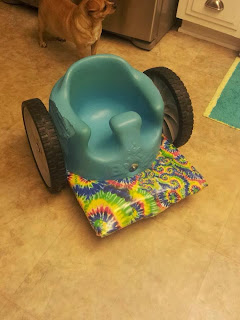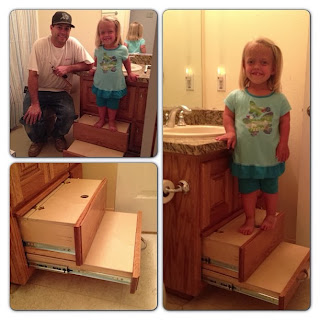By Kim Cantrell, CFILC’s Program Director
“Kim, I’ve been stuck against the closet for nearly 3 hours.
I think, I think I dislocated my hip…yeah, I think so…. And I just called an
ambulance and they are coming. I’ve been yelling for hours….wait, they are
here…gotta go…”
 |
| Mom wearing mobile medical alert device |
And then she hung up. It was my mom. She had dislocated her
hip. And questions started forming in my mind. Why was she stuck for THREE hours? What hospital was she
going to? Where was my grandpa?
Later I met my mom at the hospital and learned that she
completely dislocated her brand new hip that was less than three weeks old.
And no, she didn’t trip or fall. She simply turned and
leaned over into her hall closet. It happened that fast, and she was stuck in
an upright position.
The Decision
My mom lives with my grandfather, and we believed that if
something happened to her that he would bring her a phone or would alert a
family member. He is very hard of hearing and refuses to wear hearing aids or
any other hearing amplification device. My mom yelled for help for hours. Grandpa
couldn’t hear her. She had no other way to get his attention. Only when Grandpa
decided to go to his bedroom did he find her in the hallway. That is when he
brought her a phone. It was Grandpa who saved the day. (Hooray Grandpa!) But it
took a long time. If she had been living alone, it would have been much longer.
Afterward, Mom decided that she needed a medical alert
device. She wanted to maintain her independence and feel secure that she could
call for help in an emergency.
Most medical alert systems work by having the user wear an
emergency button around their neck or wrist. The base unit is plugged into the home's wired telephone line, ideally in a
central location. When there is an emergency, the user pushes the
button and within seconds an operator’s voice sounds loudly on the base unit and
you are able to have a two-way conversation. If the operator doesn’t hear you,
they immediately dispatch emergency personnel.
Why a Mobile Medical
Alert Device?
 |
| Mobile Medical Alert Base with GPS unit |
 |
| GPS unit in purse |
When I began my research into medical alert devices, I ran
into a problem. My mom doesn’t have a traditional landline phone through the
local phone company. Her home phone
uses a technology called Voice over
Internet Protocol (VOIP). Most Medical Alert systems only connect to
traditional landlines. I quickly learned to ask the various medical alert
companies whether they connect to VOIP systems and they all said no.
Finally, after much research, we found the best option for
my mom. We purchased a device that works on a cell network and has a GPS
tracking unit.
Here is how it works: The unit comes with one main base. You
install the base permanently in your home and there is a smaller piece that sits in the base while you are at home. This smaller piece is the GPS tracker. When you leave, you remove it from the base and carry it with you. My mom keeps it in her purse so it is always
by her side.
She wears a pendant around her neck with the emergency button. If
she has an emergency far from home, she can push the button and the service
triangulates the position of her purse, knowing that she is close by. She can
talk to the operator through the GPS device. The only time the GPS will not work is
if she is deep inside a building or parking garage that blocks reception.
We like the mobile alerts because she can call for
assistance outside of her home, which traditional medical alert services
don’t offer. She likes the service because she is always on the go. Her service
costs about $30 a month, and the equipment was leased for free with a 6-month contract.
 |
| Pendant worn around the neck |
How well does it work? She has tested it multiple times both
at home and around town, both accidentally and on purpose. So far an operator
has answered every time both quickly and professionally. She hasn’t used the
device in an actual emergency (and hopes she never has to).
My mom purchased her service in August 2012. In just one
year many other companies have jumped into the mobile medical alert game and now
offer systems similar to the one described above.
If you or someone you love doesn’t have a traditional
landline phone or is always on the go, they may find a mobile medical alert
system that will make them feel secure so they can continue their activities
of daily living inside and outside of the home.
Do Your Homework!
Please research several companies and read multiple user
reviews of their services. Many companies have sales people that work on
commission. Please do not feel pressured to sign up when you are calling for
information regardless of the “today only” discounts they offer. Make sure the
service is right for you before signing up. When my mom eventually enrolled in
a service, the company honored their “today only” discount over a week later.
The following is a sampling of companies that provide mobile
medical alert systems:
As mentioned above, do your homework. The AT Network does
not endorse or recommend any of these companies.
Have you used a medical alert device before? Please tell us
about your experience in the comments box below.
 This is the time of year when many of us strive to be better - better in our mental and physical health, with our relationships, with our finances, etc.
This is the time of year when many of us strive to be better - better in our mental and physical health, with our relationships, with our finances, etc. 

















